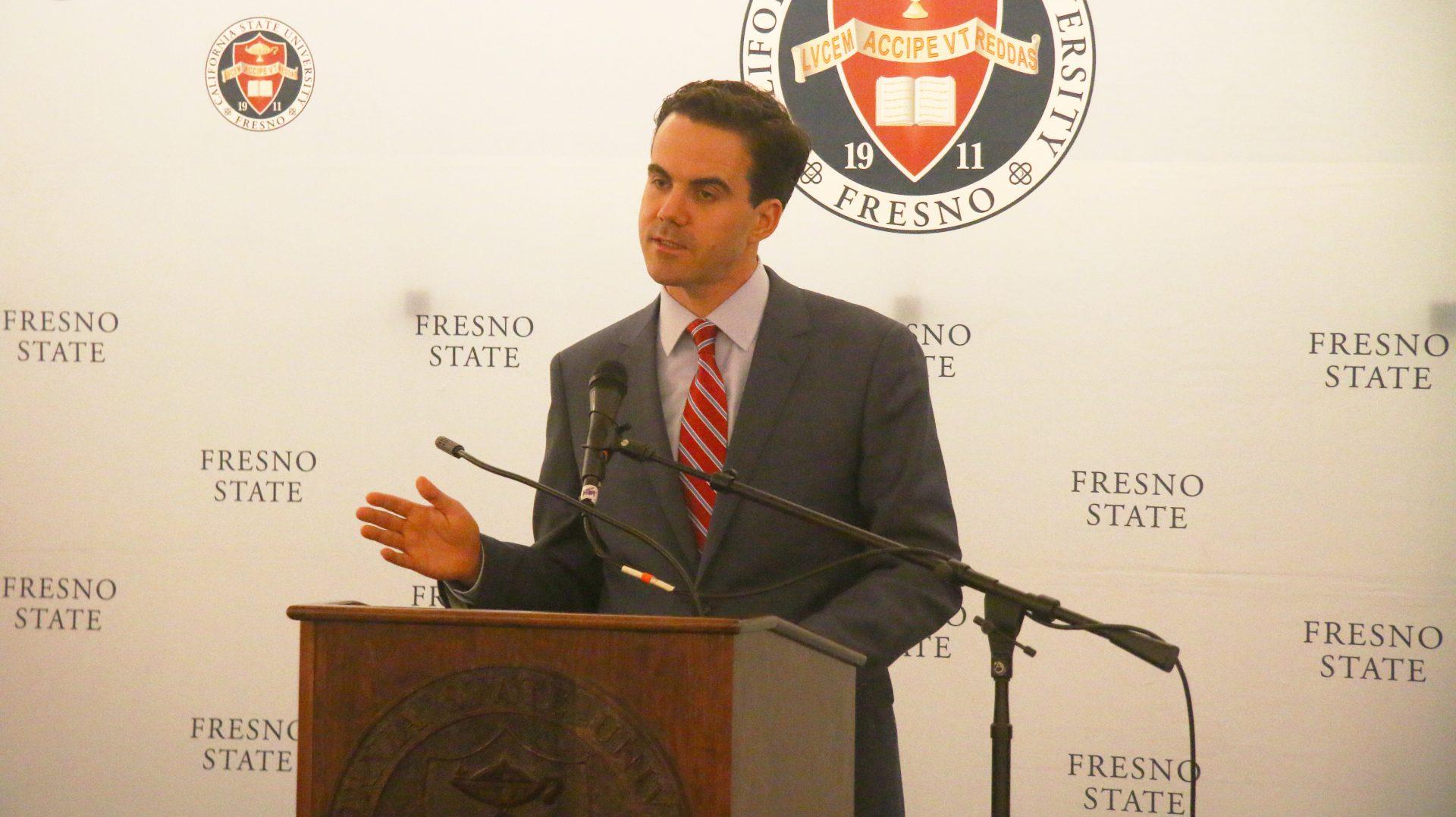Fresno State welcomed reporter and political analyst Robert Costa for the sixth installment of the President’s Lecture Series to speak about his experience in covering the White House and his views on the current climate of national politics on Tuesday, Nov. 27, at the Save Mart Center.
The lecture, which was conducted in a conversational manner between Costa and Jim Boren, founder of the Institute for Media and Public Trust, drew a crowd of more than 640 community members and Fresno State students, faculty and staff.
Costa works as a political reporter for The Washington Post, a political analyst for NBC News and MSNBC and moderates “Washington Week” on PBS.
The first topic Costa discussed was his experiences interacting with President Donald Trump, including Costa’s thoughts on Trump’s personality, public persona and political future.
“Part of him is going to want to get something done on infrastructure,” Costa said, addressing Trump’s strategy for the 2020 election. “Or does the president want to have a government shutdown…maybe he decides the Democrats in the House, they’re going to be my foil.”
Costa then addressed the possible strategies of Democrats seeking a presidential bid in 2020. He stated that California is in a unique position since the state’s presidential primaries were moved up to March of 2020, three months earlier than they were previously held.
Costa speculated that campaigning that far ahead of the election, particularly with the high cost of advertising in California, will require extensive spending and could limit the pool of candidates willing to run.
In analyzing possible bias of the media, Costa posited that media outlets, while not necessarily always having a political bias, tend to favor, or pay closer attention to, establishment politicians. The downside to this, he said, was the media’s failure to address unconventional thinking.
Prior to the evening’s lecture, the university hosted a luncheon with Costa, University President Dr. Joseph I. Castro and several students and faculty from the media, communication and journalism and political science departments.
During the lunch, Costa stated that he takes great pride in his objectivity, noting that when he accepted his first job, reporting for the conservative magazine National Review, he did so under the understanding that he would not produce opinionated or editorialized content.
Costa shared insight on his time as a reporter, but also on his college experience and the path that led him to his current position. He offered advice to students in attendance to always keep their options open, suggesting that although some might not hold a passion for particular aspects of their major, other opportunities will present themselves if they remain persistent and keep an open mind.
Costa has interviewed and built connections with politicians from both sides of the aisle. He cites his objective coverage as the secret to earning the trust of those he covers, many of whom, he says, will approach him with exclusive “scoops,” knowing he will report such stories without an attached personal agenda.
During a press conference in advance of the lecture, Costa responded to questions regarding Trump’s possible decisions regarding immigration, the future of both the Republican and Democratic parties and Trump’s proposal of a state-run media outlet.
“It’s the responsibility of the reporters to try to do our best job to try to get the story to the reader, to the listener, to the viewer, so they have the best information and to not become obsessed with debating our own value,” Costa said. “I think our value comes from the work we do.”
Costa echoed this sentiment with a quote from Marty Baron, his editor at the Washington Post, “We’re at work, we’re not at war.”
Costa, responding to a question regarding the Institute of Media and Public Trust, discussed the significance of a media literate public. He also noted that the “institutional erosion of trust” and discrediting of news media is not unique to a single party, with terms like “corporate media” and “fake news” being used by members across the aisle.
Some of the prominent political figures Costa has interviewed and reported on include Sen. Bernie Sanders, Central Valley congressman Jim Costa and, on multiple occasions, Trump.
This is the second time the university has hosted Costa for the President’s Lecture Series. The series, which began three years ago, brings speakers from across the nation to Fresno State campus to share insight on current events that could impact the Valley community.




